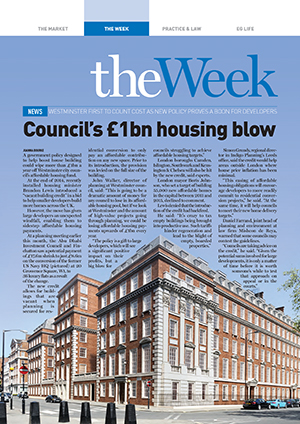 Bringing empty properties back into use and boosting house building should be an easy vote winner. That must have been on housing minster Brandon Lewis’ mind when the vacant building credit came into force last December. What does not appear to have been on the minds of civil servants in the department for Communities & Local Government, however, is the impact the credit could have on councils.
Bringing empty properties back into use and boosting house building should be an easy vote winner. That must have been on housing minster Brandon Lewis’ mind when the vacant building credit came into force last December. What does not appear to have been on the minds of civil servants in the department for Communities & Local Government, however, is the impact the credit could have on councils.
That impact, revealed by Estates Gazette (31 January, p37 – pictured right), is that councils – particularly those in London – could lose billions of pounds from their affordable housing funds. Why? Because the credit allows for buildings that are vacant when planning is secured for residential conversion to pay an affordable housing contribution only on any new space added, not the total space, as previously.
While many would expect the developer community to welcome the credit and conform to the often misheld stereotype of being money-grabbing, evil and corrupt (as believed by Russell Brand, Giles Coren et al), the Westminster Property Association stuck its neck out and openly opposed the credit.
Lewis, however, is sticking to his guns, despite the approaching general election.
Talking to EG at the British Property Federation residential summit this week, Lewis said: “If you’ve got a vacant property and we can get it back into use and it can play an important part in providing the housing that we need in large chunks of the country, it has got to be doing a good thing. I think it will be of strong benefit wherever those vacant properties are.
“If we can release some vacant properties, particularly in city areas were there is pressure on supply, get those properties back into use, get people back into communities, deliver more homes that people want, that people need then that has got to be a good thing,” he added. “Councils don’t lose out. There is a bit of a fallacy in that because if these are vacant properties then by definition the councils aren’t getting anything from them anyway. What they can get now though is of benefit for the council, because it gets the community going and gives homes to people in that community that need them. It also then ultimately brings in council tax and potentially new homes bonuses for the local authority. So, for local authorities to see anything other than a positive thing is somewhat baffling.”
Plenty of others do see the negatives, however, including London mayoral hopeful and Labour MP Tessa Jowell. She has pledged not to relent until the policy is dropped.
“The plans are so badly thought through that there is now a perverse eviction incentive for unscrupulous developers to turf out existing tenants and build the sort of luxury apartments that are well beyond the reach of anyone but the world’s super-rich,” Jowell told EG.
She has now launched a petition to scrap the guidance, with thousands apparently already signed up. Support is coming from all camps, including the Liberal Democrats, the Green Party and even the Tories.
Kevin Davis, leader of the Tory-run Kingston upon Thames council, has co-signed a letter with Jowell urging a halt to the planning avoidance.
One bone of contention with the credit seems to be a lack of engagement during its consultation, but Lewis says extensive consultation was undertaken and more than 300 responses were carefully considered before a decision was made.
The BPF, in its response, uncovered the now very public problem with the guidance. It said: “Our members’ view is that the setting of thresholds for affordable housing should be at the local level, rather than taking a one-size-fits-all approach nationally.”
Newly installed chief executive Melanie Leech adds: “A policy such as this will work well within some local authorities, but not others, and there should be scope to test its effectiveness and to put exemptions in place where necessary.”
Even consultation feedback, published by the government last November, noted some lack of clarity, saying some respondents “did not provide clear ‘yes’ or ‘no’ answers” on the proposals. With specific reference to the vacant building credit, there was a split largely between local authorities opposed to the proposal and developers in favour.
Why were so many oblivious to the consequences of the vacant building credit?
 John Walker, director of planning at Westminster city council, reckons the full extent of its implications have only become fully visible now that the planning season is back in full-swing after the traditional quiet period.
John Walker, director of planning at Westminster city council, reckons the full extent of its implications have only become fully visible now that the planning season is back in full-swing after the traditional quiet period.
He says that last month the borough saw a potential payment of £17.6m from the Abu Dhabi Investment Authority and Finchatton, on the conversion of the former US Navy HQ at 20 Grosvenor Square, W1, to 36 luxury flats, shrink to just £8.6m as a result of the change.
Over the past fortnight a number of other councils across the country have expressed serious concerns about the implications of the credit. Southwark and Islington in London and Bristol council have all come out against the credit, claiming it will affect their ability to deliver affordable housing.
The City of London Corporation says it will lose around £8m a year in affordable housing levies, while Ali Demirci, cabinet member for planning at Haringey council, believes the regulations will make it even harder for local authorities to build the homes so desperately needed.
“We would call on the government to reverse this latest policy, which will only lead to less affordable housing in our city,” he says.
There is no doubt that Lewis has good intentions in his bid to encourage house building, and his policy does not go completely unsupported.
Simon Grundy, director in the Leeds office of Indigo Planning, says: “I do feel it will be very positive toward boosting housing numbers, particularly in the regions. While things are improving in the North, there are still many large regeneration opportunities that are struggling to get off the ground. This easing of affordable housing obligations will definitely encourage developers and investors to more readily commit to residential conversion and redevelopment projects.”
But the argument seems to continuingly swing back to London, where there are grave worries about how much more office space will be lost for residential conversion and at a level of pricing that fails to fix the capital’s affordable housing shortage.
Labour London Assembly member Len Duvall says: “With London facing a massive shortfall of affordable homes, it is utterly counterproductive for the government to have introduced a scheme which effectively offers developers
a free pass on affordable housing.
“It is clear the recent scrutiny of the government’s vacant building credit by the Estates Gazette and others has uncovered significant flaws in the policy.”
The RICS also sounds a note of caution.
“There are some unintended consequences to this well-meaning policy,” said a spokesman. “We would stress the importance of new government policy initiatives to be conducted with full regard to local market impacts and capacities.”
Reverse or revise is the overwhelming message, but while opposition to the policy shows no signs of slowing down, Lewis also shows no sign of stepping down.
Have your say on the policy by tweeting us @estatesgazette using #vacantcredit











